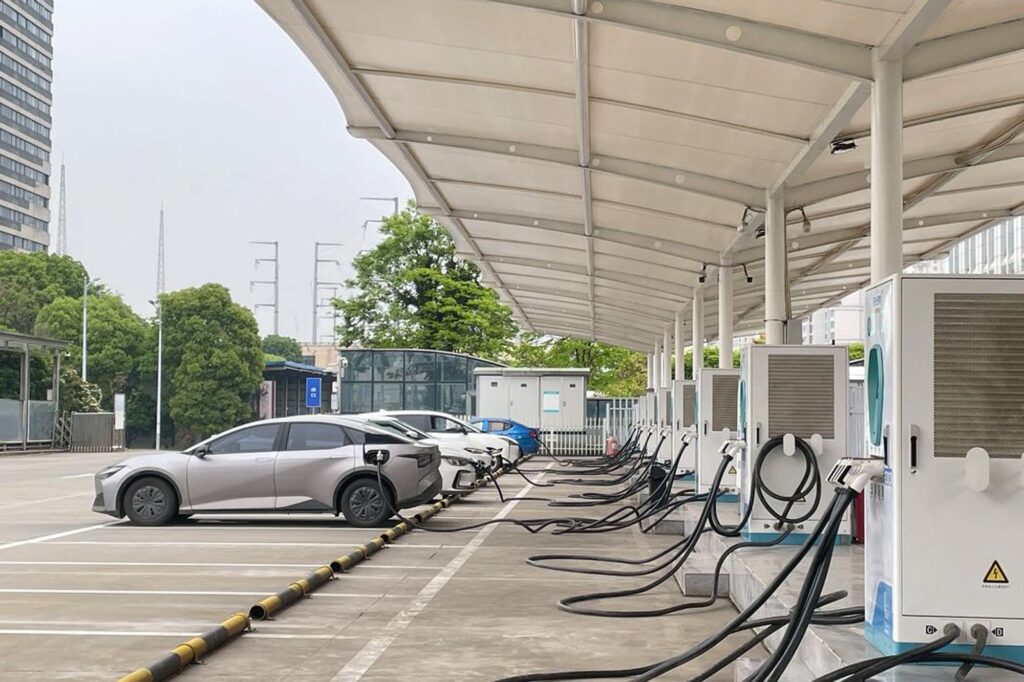Introduction
As global environmental awareness increases and electric vehicles become more widespread, the electric vehicle charging station business is emerging as a highly regarded field. Whether you are a trader or an individual user, understanding the potential and opportunities in the EV charging station business is crucial. This article will delve into how to start an EV charging business, including the related costs, profit models, and policy support, to help you seize the green energy business opportunity of the future.
1.The Potential of the Electric Vehicle Charging Station Business
1.1 Rapid Growth of the Electric Vehicle Market
In recent years, the electric vehicle market has experienced explosive growth. According to the International Energy Agency (IEA), the global electric vehicle fleet exceeded 10 million units in 2020 and is expected to surpass 245 million by 2030. This growth trend provides enormous market development space for the electric car charging station business.
1.2 Policy Support and Environmental Demands
Governments worldwide are introducing policies to support the development of electric vehicles to reduce greenhouse gas emissions. For example, the European Union plans to reduce carbon emissions by 55% by 2030 and is actively promoting electric vehicles. These policies provide strong backing for the EV charging station business, reinforcing its business model.

2.How to Start an Electric Vehicle Charging Station Business
2.1 Market Research and Site Selection
The first step in starting an electric vehicle charging station business is to conduct market research to understand the product demand and competitive landscape of the target market. Site selection is critical—choose locations with convenient transportation and high traffic, such as commercial districts, parking lots, and highway service areas.
2.2 Determining the Business Model
There are various operating models for the electric vehicle charging station business, including self-operation, franchise (ev charging station franchise cost), and cooperative ventures. Each model has its advantages and disadvantages, so choose the one that best fits your resources and market conditions. This discussion also touches on topics like how to start an EV charging stations business and the overall EV charging station business model.
2.3 Obtaining the Necessary Permits and Certifications
In different countries and regions, launching an electric vehicle charging station business may require specific permits and certifications. For example, in the United States, compliance with the National Electrical Code (NEC) and local building codes is mandatory.
3.Costs of the Electric Vehicle Charging Station Business
3.1 Initial Investment Costs
Initial investments for an EV charging station business include equipment procurement, installation, land leasing or purchase, and modifications to electrical infrastructure. Depending on the scale and equipment selection, the initial investment can range from tens of thousands to several hundred thousand dollars. This is closely related to the ev charging station business cost and even how much a commercial EV charging station might cost.
3.2 Operating Costs
Operating costs mainly include electricity fees, equipment maintenance, personnel wages, and insurance. Effective operational management and cost control are key to ensuring profitability—factors that directly affect the ev charging station profit margin and overall benefits of EV charging stations for business.
3.3 Franchise Costs
If you opt for a franchise model, you must also consider franchise fees, brand usage fees, and training costs. The franchise model can leverage established brand influence and mature operational systems to reduce startup risks, addressing common concerns such as how to start an EV charging business.

4.Profit Models of the Electric Vehicle Charging Station Business
4.1 Charging Service Fees
Charging service fees are the primary source of revenue for the EV charging station business. Establish competitive fee structures based on charging speed and market demand to ensure profitability.
4.2 Advertising Revenue
The LED display screens at charging stations can serve as advertising platforms, attracting advertisers and generating additional income.
4.3 Value-Added Services
Offering value-added services—such as car washes, dining options, and waiting areas—can enhance user experience and create additional revenue streams.
5.Profitability of the Electric Vehicle Charging Station Business
5.1 Profit Potential
The profitability potential of the EV charging station business is enormous, especially in regions with high electric vehicle adoption. As the number of electric vehicles grows, so does the demand for charging infrastructure, leading to long-term and stable revenue. This raises the question: are EV charging stations profitable?
5.2 Profit Margin
The profit margin of a charging station depends on various factors such as charging volume, fee structures, and operating costs. By optimizing operations and increasing charging volume, profit margins can be significantly improved. In areas where fee standards and other costs are relatively similar, choosing high-quality charging equipment is key to achieving profitability. As an experienced manufacturer of charging equipment, we not only provide a full range of premium charging devices but also offer customized product services for our clients. We welcome you to learn more about our offerings.

6.Challenges of the Electric Vehicle Charging Station Business
6.1 Technological Updates and Equipment Maintenance
Maintaining equipment is crucial to ensure the smooth operation of charging stations. With constant advancements in EV charging technology, timely equipment upgrades are necessary to maintain competitiveness.
6.2 Market Competition and Price Pressure
As the number of charging stations increases, market competition intensifies and price pressures grow. Differentiated services and value-added offerings are essential to enhance business competitiveness in the car charging station business.
6.3 Power Supply and Infrastructure
A stable power supply and robust infrastructure are fundamental to the normal operation of charging stations. It is vital to collaborate with power companies to ensure consistent and reliable electricity.
7.Future Trends in the Electric Vehicle Charging Station Business
7.1 Smartization and the Internet of Things
In the future, EV charging stations will become increasingly intelligent and interconnected through the Internet of Things, enabling remote monitoring, intelligent scheduling, and other functions to improve operational efficiency and user experience.
7.2 Renewable Energy and Energy Storage Technologies
With advancements in renewable energy and energy storage, EV charging stations will increasingly operate on clean energy sources such as solar and wind power, thereby reducing operating costs and environmental impacts. This trend underscores the benefits of EV charging stations and even ev charging at work scenarios.
7.3 The Sharing Economy and Platform-Based Models
Sharing economy and platform-based models will bring new opportunities to the EV charging station business. By sharing charging points and adopting a platform-based approach, investment costs and operational risks can be significantly reduced—an attractive electric car charging station business opportunity.

8.How to Choose the Right Electric Vehicle Charging Station Equipment
8.1 Charging Speed and Power
Select the appropriate equipment models and quantities based on your market positioning and user demand. Fast charging stations (DC fast chargers) are suitable for commercial venues and highway service areas, while slow charging stations (AC slow chargers) are ideal for residential areas and workplaces.
8.2 Equipment Brand and Quality
Choose reputable brands and high-quality charging equipment to ensure reliability and safety, while reducing maintenance costs and downtime.
8.3 Compatibility and Standardization
Opt for charging equipment that is compatible with a variety of electric vehicle brands and models to ensure universality and user convenience. Standardized equipment also helps in lowering procurement and maintenance costs.
9.Policy Support for the Electric Vehicle Charging Station Business
9.1 Government Subsidies and Incentive Policies
Many countries and regions offer government subsidies and incentives to support the EV charging station business, reducing startup barriers and operating costs. For instance, the U.S. federal government and various state governments provide funding support and tax incentives for charging station construction—often considered grants for EV charging stations.
9.2 Environmental Regulations and Standards
Governments are enacting environmental regulations and standards to drive the development of electric vehicles and charging stations. For example, the European Union has established strict carbon emission standards, mandating the promotion of electric vehicles and related charging infrastructure.
9.3 Construction of Public Charging Facilities
Governments are also promoting the spread of electric vehicles and the growth of the charging station business by building public charging facilities. For example, the Chinese government is actively promoting EV charging infrastructure as part of its “New Infrastructure” plan.

10.User Demand for the Electric Vehicle Charging Station Business
10.1 Charging Convenience and Coverage
Users have high expectations for charging convenience and coverage. Charging stations should be located in areas with easy access and high traffic to ensure users can charge their vehicles quickly and conveniently.
10.2 Charging Speed and Efficiency
Users demand fast and efficient charging. Fast charging stations (DC fast chargers) can meet the need for rapid charging, thereby significantly enhancing the user experience.
10.3 Charging Fees and Payment Methods
Users expect reasonable charging fees and multiple payment options. Charging stations should set competitive rates and offer various payment methods, such as credit cards and mobile payments, to improve user convenience.
11.Operation and Management of the Electric Vehicle Charging Station Business
11.1 Equipment Maintenance and Troubleshooting
Ensuring the smooth operation of charging stations requires robust maintenance and prompt troubleshooting mechanisms to guarantee equipment reliability and safety.
11.2 User Service and Feedback
Effective user service and feedback systems are essential to boost user satisfaction and loyalty. Establish comprehensive mechanisms to respond to user needs and issues in a timely manner.
11.3 Data Analysis and Optimization
Enhancing operational efficiency and profitability depends on thorough data analysis and optimization. Establish a comprehensive data analysis system to monitor charging volumes, user behavior, and other metrics in real time to optimize management.

12.Future Outlook of the Electric Vehicle Charging Station Business
12.1 Technological Innovation and Upgrades
In the future, EV charging stations will continuously undergo technological innovations and upgrades to improve charging speeds, efficiency, and overall user experience. Emerging technologies like wireless charging and automated charging robots will bring new opportunities to the commercial electric car charging stations sector.
12.2 Market Expansion and Globalization
As electric vehicles become more widespread globally, the EV charging station business will expand into more countries and regions. Through strategic partnerships and alliances, a global charging network can be established to enhance market competitiveness—an important consideration for anyone wondering how to start an EV charging business.
12.3 Sustainable Development and Environmental Protection
Looking ahead, electric vehicle charging stations will place greater emphasis on sustainable development and environmental protection. By adopting renewable energy and energy storage technologies, operational costs and environmental impacts can be reduced, fulfilling the vision of a green energy future.
Conclusion
The electric vehicle charging station business is a field full of potential and opportunities. By thoroughly understanding market demand, planning a suitable business model, and optimizing operations, you can seize this green energy business opportunity. Whether you are a trader or a user, the EV charging station business will bring substantial returns and sustainable development.
If you are interested in the electric vehicle charging station business, please feel free to consult with us immediately to learn more details and explore cooperation opportunities. Let’s embark on a new chapter in the future of green energy together!

